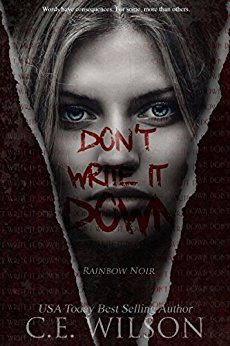Don’t Write It Down: A Rainbow Noir Novel
C.E. Wilson
2017
Live and Love the Fantasy Publications
Reviewed by Michael R. Collings
Don’t Write It Down: Episode One in the Rainbow Noir Series (A Light Horror Series) is a long title for a relatively short novel/novella; in addition, it is a bit of a misnomer. C. E. Wilson’s tale of destructive ambition has little of the rainbow in it, little of the light.
It is, instead, a gritty, at times gruesome, account of the destruction of a horror author in her obsessive quest to be number one—A New York Times Number One Bestselling Author. What begins in self-imposed drunkenness and squalor ends in a kaleidoscope of blood and guts (literally) and death.
Emma Ross’s latest novel is indeed a NYT Bestseller, resting at an enviable number two. But that is not enough for Ross, aka ‘Shade,’ a failed romance author turned horror writer. No one near to her—her cheating father, her distant mother, her cheating husband—understands her need for such a “hobby,” but her words resonate with readers and allow her the wealth to live as she wishes: “Freedom was the ultimate perk of being a top-selling author.”
But number one eludes her. Each of her new publications is countered on the lists by a new release from the estate of the recently deceased Jesson Blake who, as events disclose, has left behind a storehouse of new tales for the express purpose of denying her the coveted number one position.
Because being Number One can kill.
Because the words of the most popular writer in the world have the power to create and destroy. And the writer of those words is not immune.
When Jessen Blake invades Ross’s dreams with oblique warnings, her obsession widens to include him…destroying him, even though he is already dead. Eventually she learns the truth behind the warnings and attempts to use her words to re-shape her shattered world. And she knows that it will work because, as Ross says, “I, the world’s top-selling author, have decreed it!”
Don’t Write It Down is a concentrated exploration of hubris and mania and the perilously narrow divide between them. It is a dark and grisly metaphor for the creative and destructive power of words. In its focused detailing of Ross’s compulsions it has little of rainbows or light…but it is definitely noir and horror.









